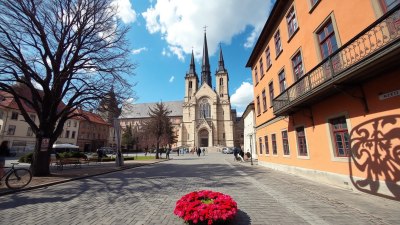City of Light and Loss in Tarnów, Poland
Explore the rich history and poignant stories of Tarnów, Poland, a city of both beauty and sorrow.

Tarnów, one of Poland's oldest cities, is a remarkable destination that embodies a narrative of both brilliance and sorrow. Nestled in the southeastern part of the country, Tarnów presents a tapestry woven from rich historical threads, tales of cultural flourishing, and profound instances of loss. Its picturesque landscape, vibrant community, and the haunting echoes of its past resonate deeply with those who traverse its cobbled streets.
Founded in the Middle Ages, Tarnów quickly emerged as a significant center of trade, culture, and learning. The city’s architecture reflects its historical journey, with Gothic churches, Renaissance palaces, and Baroque monuments standing as testimonials to its glory. The grand Tarnów Cathedral, with its striking architecture, serves as both a spiritual sanctuary and a historical site, drawing visitors to reflect upon the layers of time it has witnessed.
The Cultural Mosaic of Tarnów
The cultural heritage of Tarnów is a mosaic that reflects various influences, including Jewish, Polish, and Austrian elements. Throughout the centuries, the city has been a melting pot where different communities coexisted and contributed to its vibrant cultural life. Interestingly, before World War II, Tarnów had a significant Jewish population that played a crucial role in shaping the city’s identity.
The Jewish community of Tarnów contributed immensely to its cultural and economic life. They brought with them an array of traditions, customs, and artistic expressions that enriched the social fabric of the city. The historic Jewish quarter, with its synagogues and cultural centers, serves as a poignant reminder of this vibrant chapter in Tarnów’s history.
The Shadows of History
However, the narrative of Tarnów is not merely one of light; it casts long shadows, particularly during the tumultuous periods of the 20th century. The horrors of the Holocaust and the ravages of war led to the decimation of Tarnów’s Jewish community, instilling a profound sense of loss that lingers to this day. The Jewish Cemetery, with its dilapidated gravestones, stands as a haunting memorial to those who once thrived here. Each grave tells a story, a life interrupted, a family decimated.
Tarnów’s experience during World War II was tragic, marked by the implementation of Nazi policies that led to the displacement and extermination of countless individuals. The war transformed the landscape and psyche of the city, leaving in its wake a profound emptiness. The remnants of this dark chapter can still be felt, prompting reflections on the fragility of culture and the permanence of loss.
Resilience and Transformation
In the aftermath of such devastation, Tarnów began a journey of resilience and transformation, striving to reclaim its cultural identity and heritage. This renaissance is evident in the revival of cultural institutions, community projects, and educational initiatives that honor the memory of those who suffered while celebrating the enduring spirit of the city. Efforts to restore historical sites and engage with the diverse narratives of Tarnów’s past have fostered a renewed sense of pride among its residents.
Institutions like the Tarnów Museum play a pivotal role in this cultural revival, providing a platform for exhibitions and programs that celebrate the city’s diverse heritage. Here, visitors can explore artifacts that tell stories of joy, sorrow, and resilience, bridging the gap between the past and the present. The museum serves as both a repository of memory and a space for reflection, urging visitors to confront the complexities of history.
The Human Element
At the heart of Tarnów's narrative are its people. The resilience of the citizens who call this city home is palpable and serves as a beacon of hope. Community events, festivals, and public celebrations foster connections among residents while paying homage to the city’s multifaceted identity. These gatherings are not only a way to honor the past but also a means of looking forward, creating a sense of continuity amidst the changes of time.
Moreover, local artists and cultural practitioners have emerged as key voices in the ongoing dialogue about identity and memory. Through literature, music, and visual arts, they grapple with the themes of loss, survival, and transformation. Their works often draw inspiration from the city’s history, providing fresh perspectives that resonate with both locals and visitors alike.
The Natural Beauty of Tarnów
While the history of Tarnów is profound, the city also boasts an abundance of natural beauty. Parks and green spaces provide a tranquil escape, complementing the rich urban environment. The Dąbrówka Hill offers breathtaking views, allowing visitors to appreciate the cityscape framed by the picturesque landscape. During the warmer months, the vibrant blooms of flowers and the lush greenery create an inviting atmosphere for exploration and reflection.
Additionally, the nearby River Biała enhances Tarnów’s charm, offering opportunities for leisurely strolls along the banks or simply enjoying the serene sounds of water gently flowing. These natural elements form a backdrop for the city's history, serving as a reminder of the life that continues to flourish amidst its shadows.
A City of Light and Loss
Tarnów exemplifies the delicate balance between memory and hope. Its stories of loss and resilience intertwine, crafting a narrative that is both poignant and inspiring. The city’s ability to embrace its past, while simultaneously looking to the future, speaks to the enduring spirit of its people. Tarnów encapsulates the complexities of human experience, where light and darkness coexist, and where every corner whispers tales of joy and sorrow.
As visitors walk through the historic streets, they are invited to join this dialogue, to reflect upon their own histories while bearing witness to those of Tarnów. Each interaction, each moment spent in the city, offers a chance to connect with the enduring legacy of a place that has faced adversity yet continues to embody hope.
Visiting Tarnów
For travelers seeking to explore Tarnów, the city offers a rich itinerary filled with sites of historical significance and cultural intrigue. Walking tours can provide a guided experience, revealing hidden gems and telling stories that might otherwise go unnoticed. Local guides, often with deep personal connections to the city's history, can enrich the visit with anecdotes and insights that breathe life into the ruins and monuments.
Culinary experiences in Tarnów are also a treat for visitors. Traditional Polish cuisine can be savored in local eateries, where dishes are prepared with care and rich flavors. The warmth of Polish hospitality adds an inviting layer to the exploration, creating a memorable experience where food and culture intertwine.
The Future of Tarnów
Looking ahead, Tarnów seems poised to continue its transformation while cherishing its historical legacy. The commitment of the community to preserve and celebrate its diverse narratives is commendable. From educational initiatives that share the city’s history with younger generations to cultural events that honor the rich tapestry of Tarnów, the future appears promising.
In an increasingly globalized world, cities like Tarnów remind us of the importance of local histories and the experiences that shape identities. By embracing both the light and losses of the past, Tarnów stands as a testament to resilience, a beacon of hope amidst the shadows of history.











